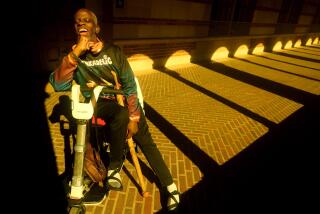CAL STATE NORTHRIDGE : These Grads Could Be a Big Help
- Share via
After Wendy Jai graduates from Cal State Northridge this week, life just might get a little easier for the rest of us.
Jai, 25, has earned her master’s degree in human factors, a psychology program that evaluates and betters human performance--from finding a library book in an intimidating computer catalogue to navigating the blind through places like Disneyland.
“We can help accommodate people according to their needs as opposed to making them conform to a certain machine or environment,” Jai said. “It prevents them from feeling excluded or handicapped.”
The handicapped have been of special concern to Jai. For her master’s thesis, she designed a prototype computer audio display that helps blind people create a mental map of a new environment they are about to enter. Her system uses different tones to indicate directions and allows blind people to trace the direction they wish to follow.
“It’s like standing at a map in the front of Disneyland,” said Jai, who successfully tested her prototype on both blind and sighted people.
Students like Jai often enter careers to work in team efforts that help people, said Mark Sanders, a psychology professor and chairman of the CSUN human factors department.
Human factors specialists can contribute to the evaluation and design of everything from toothbrushes to nuclear power plants, as well as develop psychological tests to measure performance in a nurse’s station or other workplace environment.
“It’s an area of psychology that is about as close to engineering as you can get,” Sanders said. “It’s very problem-oriented--find it, analyze it, solve it. The only reason it is in the psychology department is because it deals with human behavior.”
Former CSUN human factors students have contributed to new air traffic control systems, telephone systems, video display terminals and displays used on military aircraft.
“Our biggest problem in the department is that our students are getting hired before they get their degree,” Sanders said.
At least one human factors student, Darin Duvall, wants to solve a problem at CSUN before he enters the job market.
“There are probably thousands of books in the library people will never be able to find because they can’t use the computer system,” he said.
For his master’s thesis, Duvall, 24, will evaluate the electronic card catalogue system at CSUN’s Oviatt Library. He said he hopes to develop a more user-friendly computer system to present to the library administration for consideration.
The library project, Duvall said, symbolizes the human factors program’s goals. “Instead of asking the person to conform to the computer, you change the computer to fit the way people think,” he said.
More to Read
Sign up for Essential California
The most important California stories and recommendations in your inbox every morning.
You may occasionally receive promotional content from the Los Angeles Times.










